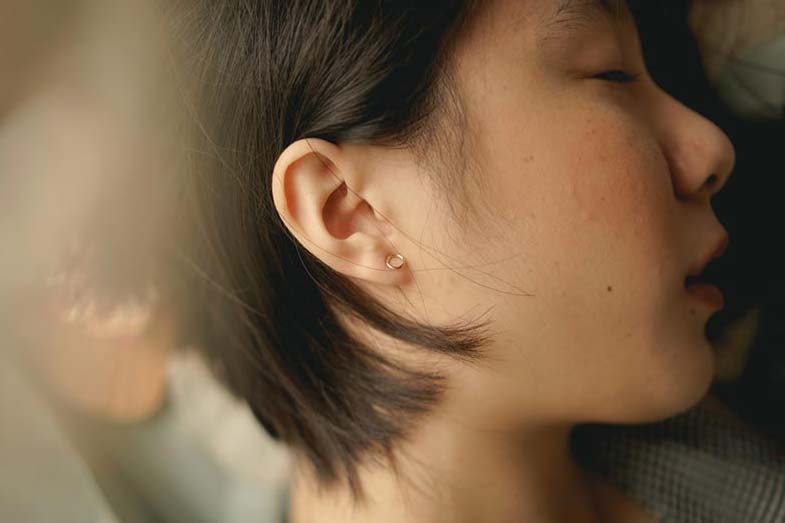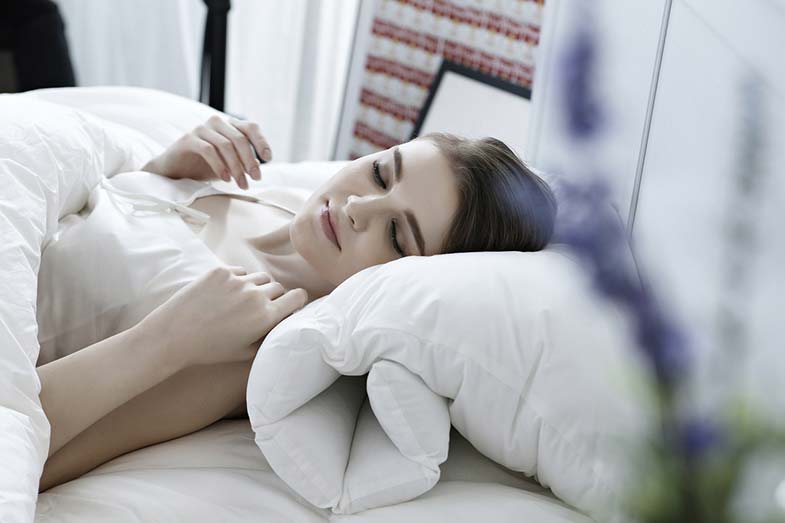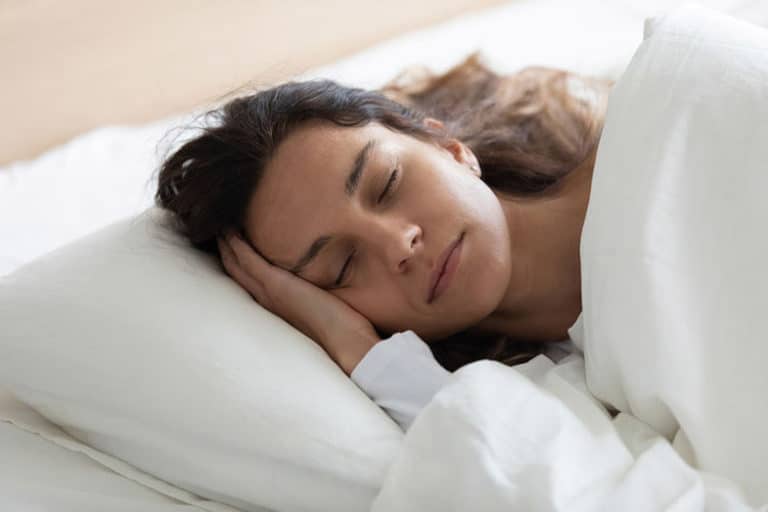Is It Normal to Not Dream While Sleeping?
Disclosure: We may get commissions for purchases made through links in this post.
More and more people today don’t get enough sleep due to busy schedules, extensive screen time, and poor lifestyles. According to the author, Derek Beres, 40% of Americans sleep less than 7 hours a day, making them miss an essential component of sleep – dreams. If you’re one who often does not dream, why does this happen?
Is it normal to not dream while sleeping? Research shows that everyone dreams; however, not everyone can remember them. Dreams occur during the rapid eye movement (REM) stage. If you lack REM sleep, it is normal not to remember your dreams the following day.
It’s important to understand the sleep cycle to know why dream recall may occur.

What is a Sleep Cycle?
The sleep cycle is a continuation of the different stages of NREM sleep to REM sleep before the cycle starts again with NREM sleep. Usually, a person would start a sleep cycle every 90 to 120 minutes, which brings about four to five cycles spent while asleep.
REM usually begins 90 minutes after the NREM cycle and is brief since it is the first REM cycle of a person’s sleep. After the 1st REM, the NREM cycle begins again starting from Cycle 1 to Cycle 3 before returning to REM sleep, which will now increase in duration as the time of sleep continues.
What are the Cycles of Sleep?
There are four cycles of sleep: the NREM (Non-REM) sleep and the REM sleep. A person undergoes three stages during NREM sleep, where each stage lasts for about 5 to 15 minutes before reaching REM sleep.
Cycle 1 – is the simplest cycle of NREM sleep and is presented by slow eye movements; a person can be easily aroused or awakened with a little disturbance during this heavy-eyed sleep stage. The muscles of the body start to relax as the brain sends lesser signals that contribute to keeping the body awake. Some people may experience jerks or even have a sensation of experiencing a fall while drifting in and out of Cycle 1.
Cycle 2 – in this cycle, body temperature and heartbeat begin to decrease as brain waves slow-down. In this stage also, the movement of the eyes begins to speed up a little. Moreover, a person cannot be easily aroused or awakened in this stage as sleep spindles, and K-complexes protect the brain from being awakened from sleep.
Cycle 3 – this is the deepest cycle of NREM sleep. It is difficult to wake someone in this cycle. Parasomnias such as sleep talking, sleepwalking, and night terrors are possible to happen in this stage.
REM sleep cycle – which is also called rapid eye movement. REM is where the dreaming period begins as eye movements speed up, moving from side to side. This is the stage where brain waves become more active compared to what happens during Cycles 2 and 3 of sleep. It is easier to awaken or arouse a person in this cycle of sleep; waking up during this cycle can leave one very drowsy.
How Does the Sleep Cycle Affect a Person’s Dream?

It is expected for an adult to sleep an average of 7 hours a day. This sleep time is divided into two halves. For a majority of people, the first half involves mostly Cycles 2 and 3 with burst periods of Cycle 1 and a short duration of REM. As a person’s sleep continues, Cycle 3 lessens while Cycles 1 and 2 maintain with a longer duration of REM happening.
Typically, a person undergoes 3 to 5 REM periods in one sleep time with the most extended period of REM happening before a person awakes. During REM, a person’s respiratory rate becomes shallow, irregular, and rapid while the eyes rapidly jerk, and muscles of the extremities temporarily paralyze.
REM is the period when most graphic dreams happen and it is possible for a person to have dreams of up to 4 to 6 dreams per night. According to the Journal of Sleep Research, it is a fact that all people dream regardless if they remember their dreams or not. Nevertheless, most of the time, a person can remember their dreams when being awakened during REM sleep.
Does It Mean You’re Psychologically Unhealthy When You Don’t Have Dreams?
According to the Journal of Neuroscience, people who spent a longer duration of REM sleep had lesser brain activity that stimulates fear when given a mild electric shock on the day after. Hypothetically speaking, researchers suggest that getting enough REM sleep before experiencing fearful situations may make a person less at risk for PTSD.
Several studies have shown that REM sleep affects how a person reads emotions and internalize external stimuli. Researchers consider sleep as an overnight therapy, as it serves as an ointment that takes away negative emotional experiences resulting in a person feeling better the day after.
Related to Norepinephrine
Researchers aren’t sure why this happens. But scientifically speaking, the adrenal medulla, which is a part of the brain that secretes norepinephrine becomes inactive during REM sleep. According to Itamar Lerner, a postdoctoral researcher from Rutgers University, stress is related to norepinephrine as it affects the degree the fear center of the brain, which is the amygdala, as it becomes sensitive to stimuli.
A theory called the REM calibration hypothesis states that norepinephrine increases during the day and gets back to its normal level during REM sleep. Lerner expressed, “The amygdala becomes less sensitive to stimuli and less likely to overreact to experience once that happens.”
How Do You Get More REM Sleep?

If you wake up in the morning remembering your dreams, it’s possible that you had a good quality REM sleep. According to Lerner’s co-author, Shira Lupkin, most people make about 20 to 25% of REM sleep per night, so the best way to get more REM sleep is to increase your time of sleep overall.
However, some factors affect normal sleeping patterns and lessen REM sleep duration. One factor is sleep apnea, a condition that keeps people awake at night because of a sudden systemic disturbance in the regular breathing pattern.
Remove Bad Habits and Improve Your Lifestyle
There are other aspects to consider, such as the consumption of alcohol, caffeine, drugs, and nicotine. Any of these will surely disrupt your sleep. If you’re unable to stop using them, you can at least minimize your intake of them, thus lessening your chances of being disturbed at night. A healthy lifestyle that is not dependent on these will allow you to have better sleep quality in no time, so it’s best to be aware of your bad habits and start incorporating ones that are healthier for you.
Lastly, there are also factors like unnatural light and alarm clocks that can prevent you from entering the REM stage, thus affecting your circadian rhythm. With modern technology, there are a lot of ways to help improve your sleep, such as wearing light therapy glasses (view on Amazon). These glasses are designed to enhance sleep patterns, boost your mood, and overcome jet lag.
Create a Comfortable Environment
For a better-quality sleep, make sure the room temperature is at a comfortable level. A cool, dark room helps prepare the mind and body for sleep. Also, adjust your schedule so that you sleep at the same time every night.
Implement good sleep hygiene such as turning your smartphones off, limiting naps, and not overeating can also help. Following these allow you to enter the REM stage more efficiently, and have dreams that you can remember once you wake up.
Before going to sleep, preparation is critical. If you like to read before bed, one thing that may help is a light therapy floor lamp (view on Amazon). It uses natural outdoor light to make falling asleep at night faster and easier. Rather than glare at your phone in darkness, use this lamp, which provides better comfort for your eyes.
Final Words – Is It Normal to Not Dream While Sleeping?
Having dreams is an important part of the sleep cycle. Whether they are recalled or not, valued, or seen as nothing more than a result of thought processes, they can be a good sign of one’s current health and sleep patterns. Take note of how you sleep, whether you dreamt or not.
Moreover, dreams also have psychological importance as they may be a reflection of a person’s fears, hopes, desires, etc. As mentioned in this article, they are also significant for a person’s physical health, as dreams are affected by sleep cycles.
Therefore, one should try to understand what may be affecting their dreams as both psychological and physical factors may affect these dreams.






